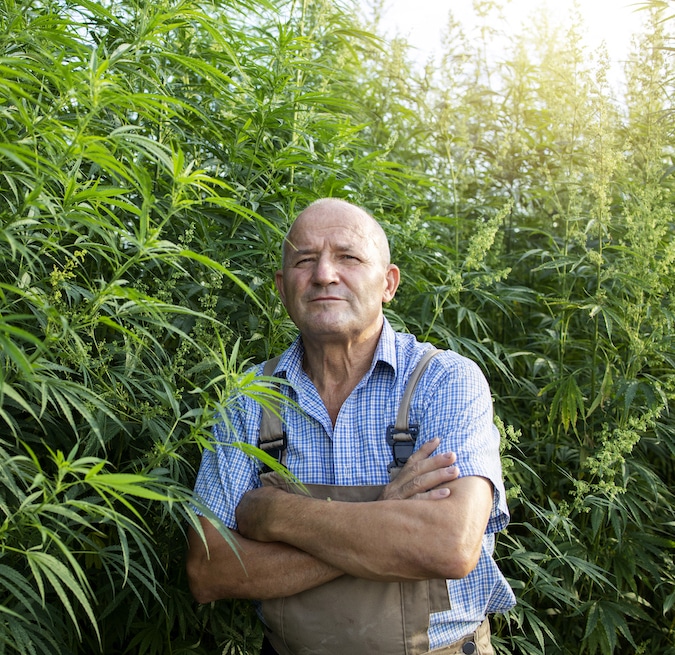The Ultimate Industrial Hemp Insurance Guide
This guide provides a comprehensive overview of industrial hemp insurance, highlighting the unique risks associated with the industry and the essential insurance policies that can protect businesses. It addresses agricultural, regulatory, financial, and compliance challenges faced by hemp companies, while outlining recommended coverage options to mitigate these risks and ensure sustainable growth in a rapidly evolving market.

Industrial Hemp Insurance Overview
Industrial hemp is an ancient industry experiencing a modern renaissance. Since the Federal Government (finally!) made the distinction between hemp and weed (“marijuana”) plants, farmers across the country got busy planting seeds. However, a lack of processing and manufacturing infrastructure led to a post-Farm Bill bust that saw prices for hemp plummet, and farmers lose money.
It was a frustrating start to such a promising industry — but if there’s one thing cannabis people know, it’s how to get up and try again.
The demand for hemp and hemp products has continued to grow year-over-year, but the main stopgap for the US is the infrastructure to process the plant domestically. This is a challenge, true, but it’s also an opportunity for creative entrepreneurs and forward-thinking venture capitalists.
Fortunately, funding is increasing as consumers and business owners seek a new, more sustainable path that aligns people better with nature, not competition. The domestic industrial hemp industry is projected to have a $32 billion impact by 2030, making this the perfect time to establish a presence.
Risks for Industrial Hemp
Like all aspects of the cannabis industry, industrial hemp faces a combination of everyday business risks and those unique to the industry. All of these risks are manageable with hemp insurance, the right plan, and a knowledgeable team behind you, but the first step is understanding what you’re up against.
Agricultural Risks
Agricultural risks pertain specifically to cultivating or growing hemp, including:
- Production risks include broken machinery and a reduced or destroyed harvest.
- Marketing risks, including the volatility of the market, price swings, and fluctuations in demand for hemp.
- Legal risks include growing a crop that tests “hot” (AKA has too much THC to sell) and dealing with regulation changes, local pushback, and theft.
- Human risks are common to any agricultural endeavor because no large farm runs well without a team.
Regulation and Compliance Risks
These risks include navigating the confusing regulations that come down from a federal, state, and local level. Compliance can mean a mountain of paperwork and meticulous record-keeping to prove you’re doing what you’re supposed to. Unsurprisingly, as with all bureaucratic processes, there’s much to manage.
Financial Risks
Financial risks apply to plant-touching and non-plant-touching businesses due to the volatility of hemp prices and the cost and scale of the necessary machines. For plant-touching companies, the risk of theft increases due to misunderstanding the difference between hemp and weed.
Recommended Insurance for Industrial Hemp Companies
Navigating the world of cannabis insurance can be confusing. But you can move forward with confidence, knowing you have a trusted industry partner at your side. Our insurance and cannabis experts make it simple to understand what policies you need and, more importantly, why you need them.
There is no one-size-fits-all for canna-businesses, but a handful of policies are essential as best practices.
General Liability
General liability offers broad protection against some of the most fundamental risks cannabis companies face. Known as “slip-and-fall” or “all-risk” insurance, this policy covers personal or property damage and bodily injury occurring on the business premises.
Product Liability
Cannabis companies offering tangible products or services risk third-party lawsuits claiming bodily injury or property damage. Product liability insurance covers defense fees and settlements, even for ungrounded claims. This coverage is particularly critical in the cannabis space as testing and manufacturing aren’t regulated at the federal level.
Cyber Liability
Cyber insurance protects companies from third-party lawsuits relating to electronic activities (i.e., phishing scams). Plus, it offers many recovery benefits, supporting data restoration and reimbursement for income lost and payroll spent.
Property
This policy is first-party coverage that protects the Total Insurable Value (TIV) of your operation’s property, reimbursing cannabis companies for direct property losses.
Crop
Crop coverage is first-party coverage that protects cannabis companies against the loss of a crop due to peril. For example, this policy would respond if lightning struck your crop and set it on fire, destroying it. These policies are specifically written to cover the entire lifespan of a plant, from seed to finished stock.
Employment Practices Liability
Cannabis companies with any number of employees face the risks of allegations, such as discrimination, wrongful termination, breach of contract, etc. This coverage protects cannabis companies against lawsuits related to employment practices.
Workers’ Compensation
Employers are typically responsible for their medical costs and lost wages when employees sustain work-related injuries. This policy covers these expenses, protecting employees while keeping cannabis companies running smoothly.
Protecting your cannabis company can seem confusing; however, we’re a full-service insurance brokerage working with carriers worldwide to offer you the best coverage possible. We’re here to help! Please reach out to us today by emailing info@alpharoot.com or calling 646-854-1093 for a customized letter of commitment or learning more about your cannabis insurance options.




